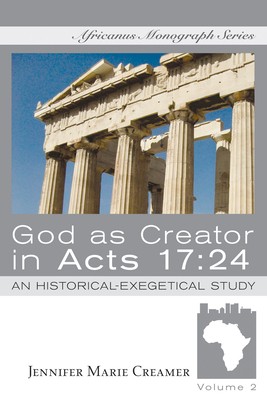
- We will send in 10–14 business days.
- Author: Jennifer Marie Creamer
- Publisher: Wipf & Stock Publishers
- ISBN-10: 1532615361
- ISBN-13: 9781532615368
- Format: 15.2 x 22.6 x 1.5 cm, softcover
- Language: English
- SAVE -10% with code: EXTRA
Reviews
Description
The Areopagus speech of Acts provides a helpful study of how Paul both engaged and confronted the contemporary culture of his day to present the message of Christianity to his hearers in Athens. How does Paul, as a Jew, contextualize the message for his audience of Stoic and Epicurean philosophers in Athens on the topic of God as Creator in Acts 17:24? Paul touches on a subject of contentious debate between Stoics and Epicureans when he identifies God as Creator. Stoics believed in a creating deity, something akin to Plato's demiurge of the Timaeus. Epicureans ridiculed such an idea. By using the identification of God as Creator, Paul engages a common controversy between schools of philosophy. ""One of the most complex and contentious issues facing the church today is related to contextualization and its boundaries. This is true in theology as well as missiology. Questions like: Do Christians and Muslims worship the same God? We need solid exposition of biblical material that can address principles in these areas more than ever. Dr. Creamer, a New Testament Greek scholar who also worked several years in India, has written a first-rate work."" --Steve Cochrane, Global Leadership Team, University of the Nations ""In a well-developed argument, Jennifer Creamer demonstrates how Paul (according to Luke) carefully chose vocabulary familiar to his audience, but filled it with Judeo-Christian thought. In his cross-cultural communication, Paul referred to God as Creator in his argument against idolatry. This publication makes a valuable contribution to the scholarly discussion on the contextualization of the topic of God as Creator in Paul's Areopagus speech as recorded in Acts 17."" --Francois P. Viljoen, North-West University, RSA ""I highly recommend God as Creator in Acts 17:24 to anyone who wants to know more about the first-century context of the Areopagus speech of Acts 17:24. How did Paul use concepts familiar to Greeks in order to introduce the unfamiliar content of the gospel? . . . This is a careful, detailed, exhaustive, and focused study of the primary sources on this timely topic: the cross-cultural communication of the gospel."" --Aida Besancon Spencer, Gordon-Conwell Theological Seminary Jennifer Marie Creamer is adjunct professor of New Testament at the Boston campus of Gordon-Conwell Theological Seminary. She has also taught biblical studies with the University of the Nations at various international campuses.
EXTRA 10 % discount with code: EXTRA
The promotion ends in 18d.05:46:05
The discount code is valid when purchasing from 10 €. Discounts do not stack.
- Author: Jennifer Marie Creamer
- Publisher: Wipf & Stock Publishers
- ISBN-10: 1532615361
- ISBN-13: 9781532615368
- Format: 15.2 x 22.6 x 1.5 cm, softcover
- Language: English English
The Areopagus speech of Acts provides a helpful study of how Paul both engaged and confronted the contemporary culture of his day to present the message of Christianity to his hearers in Athens. How does Paul, as a Jew, contextualize the message for his audience of Stoic and Epicurean philosophers in Athens on the topic of God as Creator in Acts 17:24? Paul touches on a subject of contentious debate between Stoics and Epicureans when he identifies God as Creator. Stoics believed in a creating deity, something akin to Plato's demiurge of the Timaeus. Epicureans ridiculed such an idea. By using the identification of God as Creator, Paul engages a common controversy between schools of philosophy. ""One of the most complex and contentious issues facing the church today is related to contextualization and its boundaries. This is true in theology as well as missiology. Questions like: Do Christians and Muslims worship the same God? We need solid exposition of biblical material that can address principles in these areas more than ever. Dr. Creamer, a New Testament Greek scholar who also worked several years in India, has written a first-rate work."" --Steve Cochrane, Global Leadership Team, University of the Nations ""In a well-developed argument, Jennifer Creamer demonstrates how Paul (according to Luke) carefully chose vocabulary familiar to his audience, but filled it with Judeo-Christian thought. In his cross-cultural communication, Paul referred to God as Creator in his argument against idolatry. This publication makes a valuable contribution to the scholarly discussion on the contextualization of the topic of God as Creator in Paul's Areopagus speech as recorded in Acts 17."" --Francois P. Viljoen, North-West University, RSA ""I highly recommend God as Creator in Acts 17:24 to anyone who wants to know more about the first-century context of the Areopagus speech of Acts 17:24. How did Paul use concepts familiar to Greeks in order to introduce the unfamiliar content of the gospel? . . . This is a careful, detailed, exhaustive, and focused study of the primary sources on this timely topic: the cross-cultural communication of the gospel."" --Aida Besancon Spencer, Gordon-Conwell Theological Seminary Jennifer Marie Creamer is adjunct professor of New Testament at the Boston campus of Gordon-Conwell Theological Seminary. She has also taught biblical studies with the University of the Nations at various international campuses.


Reviews